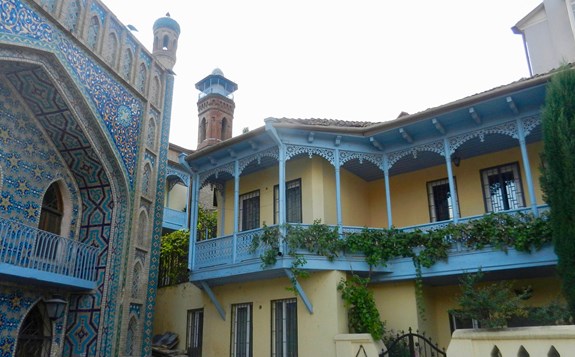Caucasus Studies
International students
International students
About the course
Caucasus Studies at Malmö University is an ‘area study’. It is based on the assumption that the history of the Caucasus matters for the understanding of contemporary political, social and economic developments and that the region’s unique geographical location is crucial for understanding the conflict dynamics in the region.
The Caucasus region is located at the crossroads of Europe, Central Asia and the Middle East. Historically the region has been dominated by different empires, including the Ottoman Empire, Persia, the Russian Empire and the Soviet Union. After the dissolution of the Soviet Union and the end of the Cold War the Caucasus region has obtained a new strategic significance. Regional great powers – Turkey, Iran, Russia – again compete for political influence in the region, which is also rich in energy resources and constitutes an important transit corridor for oil and gas from the Caspian basin to Western markets. New external actors, notably USA and the EU, compete with the ‘traditional’ regional powers for political influence in the Caucasus region and for control over its strategically important energy resources and pipeline routes.
The Caucasus is one of the most complex regions of the world in terms of ethnic and linguistic diversity. Contested borders divide similar ethnic groups and nationalities. Feelings of national 'we' are weak, while sub-national identities (clan, ethnic groups, region) are strong. The Caucasus is also a meeting place for different Islamic, Christian and pre-Christian religious traditions. Our courses provide students with an understanding of the role of ethnicity, language and religion in the post-Soviet state- and nation-building processes.
Caucasus Studies at Malmö University is the only centre in Western Europe providing distance learning courses on this topic. The flexible online design makes it easy for students to follow the courses in their home country and even to combine them with other studies or work.
The multidisciplinary staff consists of researchers with solid knowledge of the particularities of the Caucasus region, combined with extensive experience from doing fieldwork in the region.
Caucasus Studies at Malmö University has tight links with academic institutions and scholars in the Caucasus Region, as well as other international institutions with Caucasus research. The centre often hosts academics from the region who stay at Malmö University campus and actively involve in Caucasus Studies courses and research.
Course content
The aim of the course is to give the student a broad knowledge of the Caucasus – a politically turbulent region with high ethnic diversity in a vulnerable geopolitical location. The course introduces students to the Caucasus region, its ethnic groups and languages, history, patterns of migration and recent political developments.
The course consists of four modules:
1\. Introduction to the Caucasus Region (7,5 credits)
This module introduces topics of relevance to studying the region such as geography, political and administrative divisions, ethnic groups, history, and more recent developments, including post-Soviet separatist conflicts.
2\. Post-Soviet Developments in the Caucasus (7,5 credits)
This module focuses on the political, economic and social developments in the Caucasus region in the post-Soviet period. This will also include discussions of the region’s inter- and intra-state conflicts as well as geopolitical perspectives and interests.
3\. History of the Caucasus (7,5 credits)
This module explores the ancient past of the Caucasus, the region’s incorporation into the Russian Empire, Soviet historical narratives, and considers how regional actors make sense of their history.
4\. Migration in the Caucasus (7,5 credits)
This module focuses on the extensive migration flows that have shaped and reshaped the demographic map of the region. The causes and consequences of regional migration patterns will be discussed.
Entry requirements and selection
Entry requirements
General entry requirements + English 6.
Selection
34% Upper Secondary Grades - 34% Swedish Scholastic Aptitude Test (SweSAT) - 32% University Credits
Well designed courses and supportive lecturers
Alex Calvo lives in Barcelona. He studied law at SOAS (School of Oriental and African Studies), London University and became a corporate lawyer at a bank. Later he started his own practice and at the same time embarked on an academic career. He is currently an international relations professor, and...
Well designed courses and supportive lecturers
Alex Calvo lives in Barcelona. He studied law at SOAS (School of Oriental and African Studies), London University and became a corporate lawyer at a bank. Later he started his own practice and at the same time embarked on an academic career. He is currently an international relations professor, and head of the department, at European University (Barcelona Campus). He is specialised in Asian security and defence.
How come you were interested in Caucasus studies and the region?
Although not my original focus of interest, I gradually came to realize its significance, both in historical terms and to understand many contemporary issues. I also happened to have a few students from the region. As I result, I felt I needed to at least gain a basic understanding of the area.
Why is Caucasus studies an interesting subject?
The region has, among other things, a rich history, interesting geography, and a complex and fascinating mixture of peoples, languages, and religions. As a result, the subject is suitable for all sorts of people.
Why did you choose Malmö University?
Because it offered me the possibility of studying online, and because the courses seemed to be comprehensive and well designed. Since I am currently working, it is difficult for me to attend lectures. On the other hand, I value the possibility of studying a number of subjects, presented in a logical order, and with the right coordination. The Caucasus Studies courses at Malmö are much more than a mere collection of subjects.
Do you speak any of the languages of the Caucasus?
Not really, I just have a very basic knowledge of Georgian, acquired in one of the modules in the courses.
How did you find studying and working at the same time?
It is a challenge, although an increasingly necessary one nowadays. However, the materials at Malmö University make the task much easier, and I always found the lecturers very supportive.
Was the course useful for you in your professional career?
Yes, indeed, since it allowed me to teach more effectively on many issues related to the region.
Do you have any advice for students doing online courses?
Effective time management is essential. There is no single magical solution, of course, but as a general rule, I would suggest drawing up a schedule and sticking to it. It is also useful to begin one’s background reading as soon as possible.
Course literature
Current literature list is available in the syllabus for the course
Course evaluation
Malmö University provides students who participate in, or who have completed a course, with the opportunity to express their opinions and describe their experiences of the course by completing a course evaluation administered by the University. The University will compile and summarise the results of course evaluations. The University will also inform participants of the results and any decisions relating to measures taken in response to the course evaluations. The results will be made available to the students (HF 1:14).



